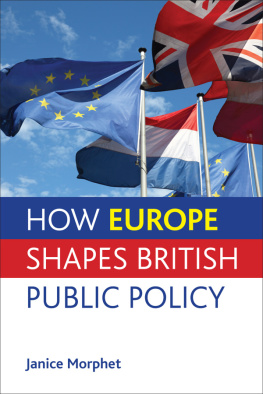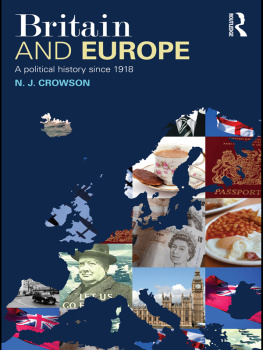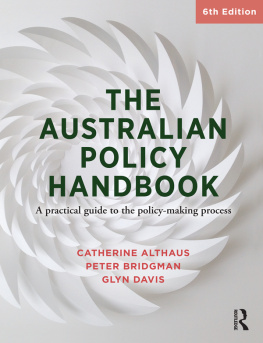HOW EUROPE SHAPES BRITISH PUBLIC POLICY
Janice Morphet
First published in Great Britain in 2014 by
Policy Press University of Bristol 1-9 Old Park Hill Bristol BS2 8BB UK Tel +44 (0)117 954 5940 e-mail
North American office: Policy Press c/o The University of Chicago Press 1427 East 60th Street Chicago, IL 60637, USA t: +1 773 702 7700 f: +1 773-702-9756
Policy Press 2014
British Library Cataloguing in Publication Data
A catalogue record for this book is available from the British Library.
Library of Congress Cataloging-in-Publication Data
A catalog record for this book has been requested.
ISBN 9781447320494 ePub
ISBN 9781447320500 Kindle
The right of Janice Morphet to be identified as author of this work has been asserted by her in accordance with the Copyright, Designs and Patents Act 1988.
All rights reserved: no part of this publication may be reproduced, stored in a retrieval system, or transmitted in any form or by any means, electronic, mechanical, photocopying, recording, or otherwise without the prior permission of Policy Press.
The statements and opinions contained within this publication are solely those of the author and not of the University of Bristol or Policy Press. The University of Bristol and Policy Press disclaim responsibility for any injury to persons or property resulting from any material published in this publication.
Policy Press works to counter discrimination on grounds of gender, race, disability, age and sexuality.
Cover design by Qube Design Associates, Bristol
Front cover: image kindly supplied by istock
Readers Guide
This book has been optimised for PDA.
Tables may have been presented to accommodate this devices limitations.
Image presentation is limited by this devices limitations.
For Robin, Sophie and Charlotte
Contents
|
|---|
| BIS | Department of Business, Industry and Skills |
| CEC | European Commission |
| CCT | Compulsory Competitive Tendering |
| CoP | Community of Practice |
| CPRS | Central Policy Review Staff |
| CSR | Comprehensive Spending Review |
| EAP | Environmental Action Programme |
| EEA | European Economic Area |
| EFTA | European Free Trade Area |
| EGTC | European Grouping of Territorial Cohesion |
| EIA | Environmental Impact Assessment |
| EPI | Environmental Policy Integration |
| ERDF | Europa Regional Development Fund |
| EU | European Union |
| FDI | Foreign Direct Investment |
| GATS | General Agreement on Services |
| GATT | General Agreement on Tariffs and Trade (until 1995) |
| GPA | Government Procurement Agreement |
| HMG | Her Majestys Government |
| HMT | Her Majestys Treasury |
| HOCL | House of Commons Library |
| IfG | Institute for Government |
| IMF | International Monetary Fund |
| LA21 | Local Agenda 21 |
| MP | Member of Parliament |
| MEP | Member of the European Parliament |
| NATO | North Atlantic Treaty Organisation |
| NPM | New Public Management |
| OECD | Organisation of Economic Co-operation and Development |
| OGDs | Other Government Departments |
| OMC | Open Method of Coordination |
| PASC | Public Accounts Select Committee of the House of Commons |
| PBR | Pre-Budget Report |
| PSA | Political Studies Association |
| RDA | Regional Development Agency |
| SA | Sustainability Assessment |
| SEA | Single European Act 1987 |
| SEM | Single European Market (1992) |
| TENs | Trans-European Networks |
| TIA | Territorial Impact Assessment |
| UN | United Nations |
| UNCTAD | United Nations Commission for Trade and Development |
| WEF | World Economic Forum |
| WTO | World Trade Organization |
This book uses the term European Union (EU) throughout, although since its inception in 1957, it has legally been the European Economic Community (EEC) or known as the European Community (EC) or abbreviated as CEC from the French. The EU came into being as a result of the Treaty of the European Union (TEU) in 1992, which is also known as the Maastricht Treaty or just Maastricht. Although for some legal purposes, the EEC remains the appropriate term, it is easier from the point of view of the reader to use the single term EU, so that it what is used here.
The European Commission is referred to throughout the book as the Commission. There is little reference to the role of the European Parliament in terms of policymaking. This is not to underestimate its important and increasing role, but it is not discussed here in any detail.
The term Europe in this book title and the text refers primarily to the EU and does not extend to the wider geography that is Europe or the other European institutions including the Council of Europe, which comprises 47 members in comparison with the 28 in the EU.
Finally, this book uses the term British to include the policies, government and jurisdiction of the United Kingdom.
Directives bind governments as to the results required but leave the choice of means to them.
Regulations directly enter into the domestic law of all member states.
Decisions upon particular matters bind those governments or institutions to which they are addressed (Young, 1973, p xiii).
Janice Morphet has had a career in local and central government as an academic and a consultant. She has degrees in sociology, management, politics and literature. Her career started as a planner in London then moved to work in regeneration and project management. Janices interest in the UKs membership of the EU and its interrelationship with British public policy developed while she was responsible for services that were opened to competition. This was extended through widening interest and application of sustainability in local government, when she was part of a small group of advisers representing British local government within wider European local government organisations. She has since been the chief executive of a unitary authority and a local government adviser in central government.
In 1994, I attended a reception in the European Parliament on the evening before the first meeting of the Committee of the Regions. As part of the support to the UK local government delegation, there was a hopeful feeling among our group. Local government had been through a difficult time since Thatcher became Prime Minister in 1979, and although she had gone, there was still a sense that local government was undervalued and fighting to fulfil its role. The Committee of the Regions was a new affirmation of the role of sub-national government, which might help to change this position in the UK. The reception room was crowded with all the other delegations and there was a good buzz of conversation in the air. After about 30 minutes or so conversing in our group, I looked around to find that the UK delegation was the only one left in the room. All the others had disappeared. Where had they gone? Had we overlooked some other event? On enquiring, I found that all of the other delegations had agreed to have joint pre-meetings and briefings over dinner. They had planned to meet up with old friends and to make new alliances. No one had asked the British delegation to join them and we were insufficiently experienced in working in Brussels to make our own arrangements to do this. This was a timely reminder of the way the UK operated and how separate we were.













